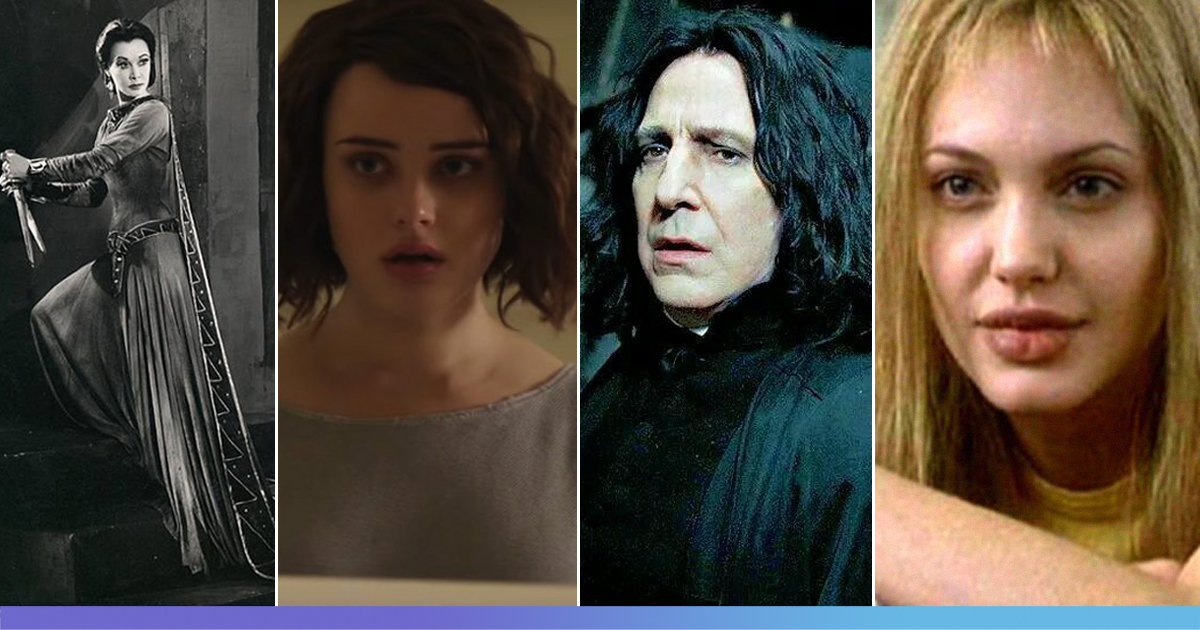Mental illness is not a modern phenomenon. However, the societal outlook towards mental illness and the individuals battling it have definitely evolved over the centuries. History might tell us about celebrated monarchs or their idiosyncrasies, but a true picture of people’s perception of mental illness can be traced only through the pages of literature.
Ever since English literature began evolving, the issues were not just dealt with by physicians, psychiatrists and psychologists, but were taken up with fervour by poets and writers. Literature reflects an increasing willingness to explore mental health through interestingly created characters, often unusual and eccentric.
Let us take a look at how some of the literary characters, including many of our favourites, who knowingly or unknowingly battled mental illnesses.
The Eccentricity Of ‘Insanity’ In Shakespeare’s Works
Mental health seemed to have a curious fascination for Shakespeare. While melancholy was almost an ailment prone to adversely affect writers and poets; rejected or unsatisfied lovers were often at the risk of mental collapse.
However, romance was not alone responsible for causing what is often referred to as ‘madness’ in Shakespeare. Mischance or trauma, overwork, shock or religious torment could also cause a person to lose their reason. Even though he does not explicitly use the words ‘depression’ or anything else to do with ‘mental health’, these are precisely the reasons behind many of his characters living a mentally unhealthy life.
Take Lady Macbeth for example.
“I still have the smell of blood on my hand. All the perfumes of Arabia couldn’t make my little hand smell better. Oh, oh, oh!”
Perhaps, Lady Macbeth is one of the most haunted minds Shakespeare has created. Haunted by the murders committed by Macbeth, with her instigation prompted by her urge to satiate her irresistible hunger for power, Lady Macbeth suffers from Post Traumatic Stress Disorder (PTSD), Obsessive/Compulsive Disorder (OCD) and Parasomnia. PTSD occurs when one witnesses a traumatising event, and Parasomnia includes abnormal behaviour during sleep, such as sleepwalking. Lady Macbeth’s sleepwalking scene is one of the most talked about. The constant washing of her hands to get rid of the imaginary blood shows she was suffering from OCD.
Hamlet’s quest for revenge and his madness resulted in his death. In the beginning, he is visited by his father’s ghost, who tells him that he was murdered by Claudius, driving Hamlet to want to seek vengeance. Hamlet’s ‘madness’, as many would call it, very likely stems from an actual mental illness, perhaps a depressive illness. He suffers from melancholy, and his father’s death worsens the pre-existing condition. He displays pessimistic thoughts and negativity throughout the play. Unable to cope with it, he keeps falling deep into the abyss of depression.
Hamlet’s Ophelia, too, shows symptoms of depression. “I do not know, my lord, what I should think”, Ophelia tells her father Polonius, indicating her unwillingness to have an identity of her own. Her father’s identity was her identity, and the loss of that identity drove her into further depression, ultimately resulting in her death.
King Lear has served as inspiration for psychologists, psychiatrists, and psychoanalysts. The play deals with Lear’s quest to seek refuge and love with his daughters, and his slow descent into becoming mentally unhealthy thereafter. Interested health professionals today diagnose Lear with mental illnesses like senile dementia, mania, bipolar disorder, and delirium.
These Shakespearean protagonists have undoubtedly portrayed vivid symptoms of some kind of severe psychotic disorder or the other. Lurid representations of their eccentricities by the Bard have gone on to add more flavour, and even romanticism, to his timeless classics.
However, one of his lesser celebrated works goes on to glorify the dangerous practice of gaslighting and manipulation in a relationship, which is considered as two of the key contributors to mental health problems in modern society. The Taming Of The Shrew – where a proud and snobbish Katherina is ‘schooled’ to become a gentle, obedient wife by a highly manipulative Petruchio – reeks of misogyny in every aspect.
Though such trends might have disappeared from modern literature, unfortunately, the practice has not. Even today, many women and men bear the brunt of mentally abusive relationships, where gaslighting often drives the survivor to severe trauma, depression, anxiety and even paranoia.
Mental Illness In Victorian Classics
“What it was, whether beast or human being, one could not, at first sight tell: it grovelled, seemingly, on all fours; it snatched and growled like some strange wild animal: but it was covered with clothing, and a quantity of dark, grizzled hair, wild as a mane, hid its head and face.”
In Charlotte Brontë’s novel, this is how Jane Eyre describes Mr Rochester’s wife Bertha, a woman with an unknown hereditary mental illness, who has been locked up in an attic for ten years. Back in Victorian England, locking away the ‘insane’ was not uncommon or unheard of. In fact, it was often considered a kinder way to treat someone suffering from such an illness, rather than sending them to an asylum. One of the most significant features of the novel is Bertha’s ‘madness’, and its imagery defines society’s perception of mental illness – characterised by stigma, shame and lack of concern.
Coming to Gustave Flaubert’s Madame Bovary, the protagonist’s constant search for obsessive, passionate relationships she sees in her books causes immense dissatisfaction in her. In fact, after the appearance of 19th-century romantic novels, a behavioural disorder called the Madame Bovary Syndrome was identified. It was first described in 1892 by the philosopher Jules de Gaultier. The disorder is characterised by addiction to romance, impossible relationships, mimicking the beloved person, and constant dissatisfaction.
Unknown to many, The Picture Of Dorian Gray by Oscar Wilde has also birthed a mental health condition in the psychiatry encyclopedia, christened as Dorian Gray Syndrome. The evolving personality of Dorian Gray in the novel denote the clinical symptoms of the condition. It is, precisely, an extreme form of narcissism in a person about his personal appearance and physique. The sufferers of Dorian Gray syndrome are unable to cope with the natural ageing of their body. They struggle to retain their youthful mien in whatever way possible. This is quite a rising concern in modern times, as evident from the popularity of anti-ageing formulae, botox and cosmetic surgery.
Fyodor Dostoevsky’s classic novel Crime and Punishment focuses on a young man, Rodion Romanovich Raskolnikov, who decides to murder a pawnbroker for her money, after being forced to drop out of studies due to his poor financial condition. He struggles to relate to people and loathes human nature. The author provides us with an extremely vivid portrayal of the complex psychological and mental state of the criminal’s mind, while he walks us through the character’s actions, his interaction with people, and his inner monologues as he frantically roams about in the streets of St Petersburg.
A common theme of depression persists throughout Mrs Dalloway by Virginia Woolf, especially in the character of Clarissa Dalloway. Her depression is characterised by her pessimistic views on society. PTSD is another mental illness vividly illustrated in the novel by the delusions of Septimus. This causes great anxiety and depression in him, and he feels isolated as he believes that no one can really understand his traumatic experiences in the war. Throughout the novel, he fails to communicate his feelings, which ultimately leads to his suicide. This could be considered a desperate plea for help. Even today, thousands of people suffering from depression and other mental health issues are afraid to communicate for fear of being misunderstood and judged by society.
Robert Louis Stevenson’s famous gothic novella Strange Case of Dr Jekyll and Mr Hyde revolves around a man who transforms between two personae: Dr Henry Jekyll and Mr Edward Hyde. This is a well-known example of the psychiatric disorder ‘split personality’, which is characterised by two distinct identities of a person, which can often be very good or very evil. The disorder is also accompanied by memory impairment for important information. This, in fact, cannot be explained by ordinary forgetfulness. However, there is a common misconception in society that schizophrenia is the same as a “split personality”.
The character of Miss Havisham in Charles Dickens’ Great Expectations portrays a vivid picture of Victorian psychiatry. Throughout the novel, the eccentricity in a rich, lovelorn woman is overshadowed by the connotations of ‘insanity’ in her, which the author had written not so subtly. Her stark white wedding attire, dishevelled appearance and demeanour exude every bit of the primitive perception of ‘madness’, accentuated by her bouts of hysteria. It perhaps won’t be an exaggeration to say that her character was penned to be “the witch of the place” – not to be empathised but to be pitied, or even despised by readers. As identified by modern psychologists, Miss Havisham might have been a patient of manic hysteria with sudden mood swings.
Mental Health In Modern And Postmodern Literature
“Among other things, you’ll find that you’re not the first person who was ever confused and frightened and even sickened by human behavior. You’re by no means alone on that score, you’ll be excited and stimulated to know. Many, many men have been just as troubled morally and spiritually as you are right now,” Mr Antolini tells Holden Caulfield in The Catcher in the Rye.
In this passage, Mr Antolini helps Holden overcome the tremendous anger and hostility he feels towards the world, by offering him some wisdom.
Entering into childhood, teenagers naturally deal with anxiety. Holden recognises the innocence and instinctive happiness of childhood and finds it hard to cope with the imperfections and complexity of the adult world. Acutely aware of the “fall” that approaches him, Holden isolates and alienates himself from the world that comes across as wicked and unjust to him.
Today, when one reads The Catcher in the Rye, they can easily infer and analyse that Holden is definitely not mentally healthy. He possibly suffers from a combination of depression, post-traumatic stress disorder (PTSD), and anxiety. In fact, Holden himself confesses that after he broke the garage windows, his parents planned to have him “psychoanalyzed and all”.
Arthur Radley or ‘Boo’ Radley is a reticent character in To Kill A Mockingbird – Harper Lee’s timeless classic, until the very end. Throughout the novel, amidst the racial and social disparities presented superbly, Boo Radley remains a dreaded entity. His reclusive nature, most probably due to a prominent social anxiety disorder, led the neighbourhood to regard him as a fearful, ghastly person, giving rise to psychopathic rumours about him. His act of saving Scout near the very end of the book establishes him in the brightest positive light ever. Through Atticus’s gratitude towards Arthur, Harper Lee thus showed a backward society how mental health patients should be treated, as fellow humans first and foremostly.
Finally realising that Boo must be hiding away to escape the racism and ugliness of the town where people are treated unfairly for being different, Jem says: “I think I’m beginning to understand why Boo Radley’s stayed shut up in the house all this time. It’s because he wants to stay inside.”
“Wherever I sat — on the deck of a ship or at a street cafe in Paris or Bangkok — I would be sitting under the same glass bell jar, stewing in my own sour air.”
This almost tangible description of Sylvia Plath’s own clinical depression can be found in her novel The Bell Jar. In this semi-autobiographical novel, Esther Greenwood muses over the mental illness that she does not fully understand, an illness that has seeped deep within and covered her completely. Yet again, society’s lack of understanding of clinical depression is portrayed in the novel, as Esther is considered to be ‘insane’, stays in an ‘insane asylum’, where she is hardly treated, but controlled and managed instead.
The dark, scary reality of such ‘insane asylums’, outwardly designated with hopeful words like ‘care’ or ‘comfort’, was brought out unabashedly in two novels – Ken Kesey’s One Flew Over The Cuckoo’s Nest and Susanna Kaysen’s Girl Interrupted. The first is a work of fiction while the latter is a tell-all memoir by the author, who survived the abuse and coercion at a mental health facility where she was admitted after a failed suicide attempt.
Ken Kesey’s novel gained the spotlight after the surmounting success of its screen adaptation, starring Jack Nicholson as protagonist McMurphy. It has been attributed time and again to have revolutionised mental health care. Before the book created a furore, few were aware of the brutal Electric Shock Therapy or inhuman harassment that went on rampantly inside most mental health centres.
Undoubtedly this sparked an outrage, thereby leading to a new era of research in advanced antipsychotic medications and an eventual ban on “the sleeping pill, the electric chair and the torture rack” as mentioned by Nurse Ratched in the novel.
Girl, Interrupted was immortalised onscreen by award-winning performances from Angelina Jolie and Winona Ryder, distinctly delineating how mishandling of critical mental health patients can turn things into worse.
Most of us do not ponder over the fact that mental illness is an underlying theme in J.K. Rowling’s famous Harry Potter series. To the naked eye, it deals with magic, but if you look more closely, you can learn a lot about mental health from it as well.
The Dementors vividly represent depression. They suck the happiness out of you, and you are constantly reminded of your past, which you cannot get over. “They infest the darkest, filthiest places, they glory in decay and despair, and drain all the peace, hope, and happiness out of the air around them….You’ll be left with nothing but the worst experiences of your life.”
Even if he does not clearly remember it, Harry did see his parents being murdered by Voldemort. Without a doubt, Harry does suffer from PTSD. Given the trauma of his earlier life and the constant battles he fought in his adolescence, it is no surprise that Harry suffers from some mental illness. He keeps experiencing an onslaught of violent memory hallucinations as the story progresses.
Severus Snape, on the other hand, deals with depression and grief. Being bullied as a child and the loss of his lady-love naturally make his life miserable.
Without a question, Lord Voldemort is a psychopath. His joy at others’ loss, complete lack of empathy, manipulative nature, violent behaviour, failing to feel any guilt or remorse for his actions evidently points at psychopathy.
John Green, everyone’s favourite author of the heart-wrenching novel The Fault In Our Stars, has boldly unveiled the struggles of mental illness through his latest character Aza Holmes, the teenager storyteller in Turtles All The Way Down. Her daily trysts with severe anxiety and Obsessive-Compulsive Disorder is blatant, graphic and scary. Her recurring struggles allow readers to associate and understand the disorders in-depth. The fruitless meetings with her psychiatrist and her dilemma about popping a long list of pills to feel ‘normal’ – is something very common and very concerning among adolescents as well as adults today.
“I hope you’re ready, because I’m about to tell you the story of my life. More specifically, why my life ended. And if you’re listening to these tapes, you’re one of the reasons why.”
Does that ring a bell? Yes, that’s our beloved Hannah Baker.
Mental health as portrayed by Jay Asher in 13 Reasons Why deserves to be highlighted. Hannah Baker is a simple girl, happy and carefree, but bullying and physical abuse slowly push her into the dark hole of clinical depression. However, Hannah, and everyone around her, including her school counsellor Kevin Porter, fail to identify it and get her proper treatment. Consequently, Hannah commits suicide.
Proper diagnosis of mental health issues is essential. However, many of us believe depression to be another phase of sadness and tend to overlook it, not realising that we are harbouring demons inside.
Hannah’s conversation with Mr Porter is a glaring example of how she is trying to seek help and how Mr Porter fails to help her. Her helplessness and the emptiness she feels hit us right in the heart.
“It’s just… things. Everything’s so hard now,” Hannah says.
“Right now I feel lost, I guess. Sort of empty.”
“Just empty. Just nothing. I don’t care anymore.”
These simple words, spoken by Hannah, scream ‘depression’.
Mr Porter: Well, what do you need right now that you’re not getting? Let’s start there.
Hannah: I need it to stop.
Mr Porter: You need what to stop?
Hannah: I need everything to stop. People. Life.
And life soon stopped for Hannah Baker. But it does not need to stop for me, you or anyone else. Through their oddities, most of these fictional characters have paved their way into our hearts, at a place where mental illness does not dictate a person’s identity. If you revere Severus Snape, you ought to respect, understand and support the depressed person next to you. If you identify your shadow in Esther’s plight, take a step forward and seek help. Maybe tomorrow, your story of struggle with mental health will become another person’s ray of hope.
Also Read: My Story: “Dealing With Mental Health Is A Struggle, Let Alone Society’s Stigma Around It”












